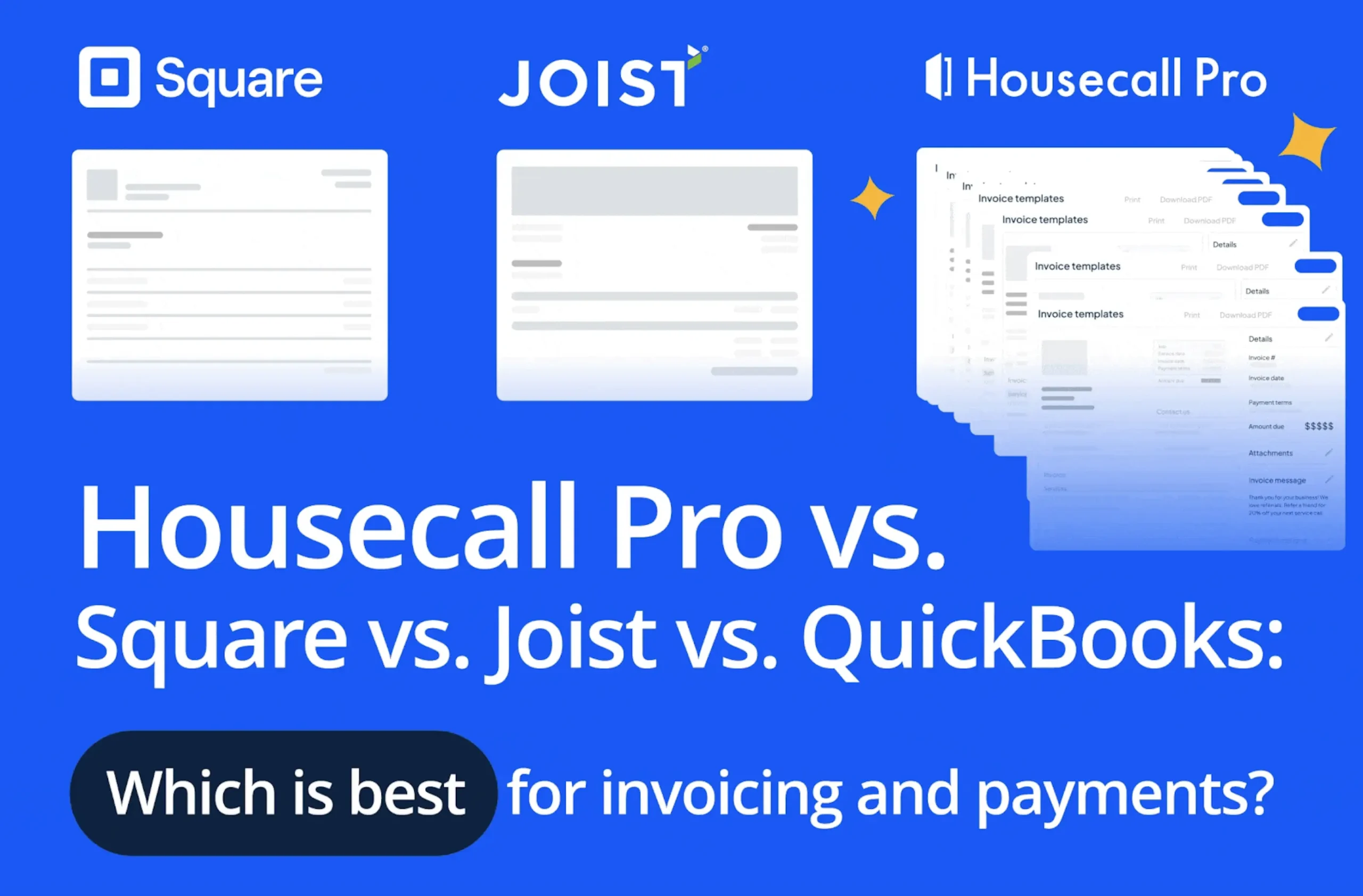
Since Benjamin Franklin’s infamous kite experiment back in 1752, electricity has become a way of life. In fact, our lives depend on it. We need electricity to charge our mobile devices, to give us light in the dark hours of the night, to keep the food in our refrigerator cold, and now, even to power our electric vehicles.
So, when the electricity goes out or there is an electrical problem in someone’s home or business, they want it fixed—now. And that’s why there are an estimated 70,000 electrical businesses in the U.S. And trust us, there is plenty of demand for those services.
In this article, the team over here at Housecall Pro will let you in on everything you need to know to start your own electrical business and keep the lights on across the U.S.
Step 1: Get the Required Training and Certifications
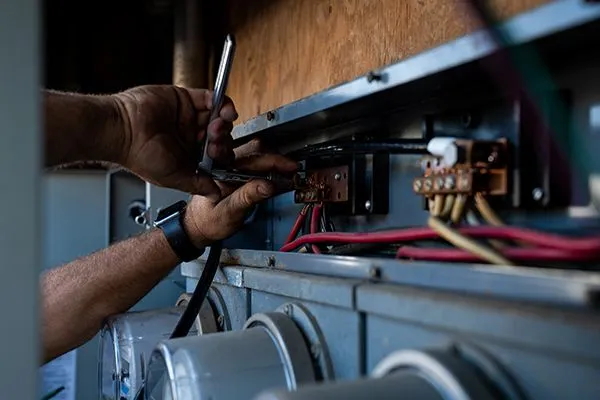
An electrical business is one of those that requires extensive training as well as certification in order to get started. Customers aren’t going to want someone tampering with their electrical systems if they don’t know what they’re doing.
However, an electrical business’s specific training, certification, and licensing requirements vary from state to state. For example, in California, an electrician must hold a state license to work on projects valued at $500 or more. The C-10 Electrical Contractor license, issued by the Department of Consumer Affairs, Contractors State License Board, is mandatory. To qualify, you need four years of experience at a journeyman level or as a foreman, supervisor, or contractor. Additionally, you’ll need to pass both a law and business exam and a trade exam, and submit a $25,000 bond.
Be sure to check into the requirements for your state and follow the process accordingly.
Learn more: Electrical licensing requirements state by state.
Step 2: Develop a Business Plan

Your business plan is one of those things that will take some time and effort, but will be well worth it in the long run. This document pretty much encompasses everything about your business—the services you will offer, the customers you will serve, how you plan to market to your customers, and how you will fund your business. And, if you need a small business loan, your business plan must be submitted to the lender as part of the consideration process.
Most business plans include the following key components.
- Cover Page: Business name, logo, and contact information.
- Executive Summary: Overview of your business and funding needs.
- Business Overview: Business structure, company name, and registration details.
- List of Services: Detailed description of the electrical services you plan to offer.
- Market Analysis: Target customers and competition analysis.
- Business Operations: Pricing strategy and profitability overview.
- Marketing and Sales: Marketing strategy, channels you will use, and sales conversion goals.
- Financial Plan: Sales forecast, budget for expenses, and marketing costs.
3. Secure Funding For Your Business
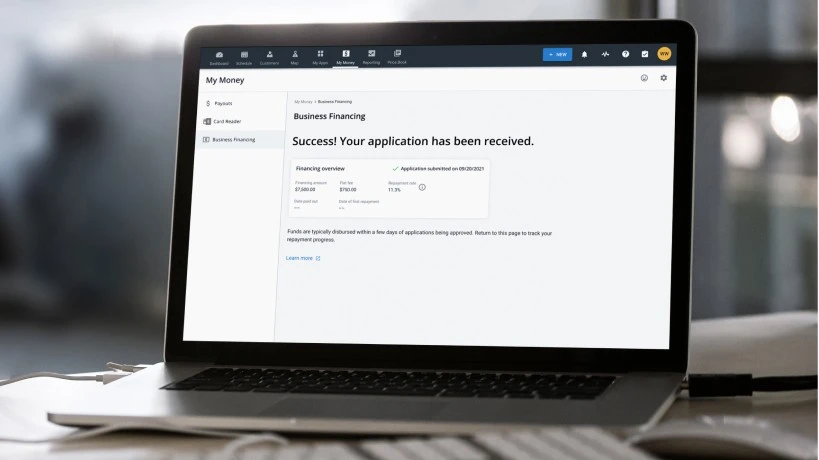
With your business plan at the ready, you will be positioned to secure funding if needed. Most electrical businesses cost between $5,000 and $25,000 to get started. You’ll need to make some upfront investments in tools, equipment, a work van, your certification, and the marketing costs to help tell your target market that you are available to solve their electrical challenges.
While you may have the cash needed to get started, most people don’t have this money readily available. Therefore, exploring funding options is the next step. You might consider applying for small business grants, which government programs or private organizations often provide.
Alternatively, securing a small business loan from a bank or credit union can provide the necessary capital. Additionally, seeking investments from family, friends, or angel investors can help you gather the funds you need to launch your business. Each option has its own requirements and benefits, so be sure to do your homework.
Learn more: Secure the funding you need to get your new electrical contracting business off the ground with business financing from Stripe Capital & Housecall Pro. Get approved as soon as the next business day.
4. Register Your Business and Obtain Licenses
Be sure to look into the steps for registering your business and obtaining licenses before you get too far into the process of starting an electrical business. As with training and certification requirements, the registration and licensing process can vary from state to state.
This said, one of the first decisions you’ll need to make is choosing a business structure, such as a sole proprietorship, partnership, limited liability company (LLC), or corporation. This decision will impact your taxes, liability, and other important aspects of your business. After deciding on a structure, you must register your business with your state’s Secretary of State office.
Next, you’ll need to obtain the necessary state and local licenses. Typically, this includes passing an electrical exam and possibly applying for a general contractor’s license, depending on your state’s regulations. Additionally, you’ll need an Employer Identification Number (EIN) from the IRS for tax purposes.
Besides your electrical license, obtain a business license and any other permits required by your local jurisdiction. Some states may require a contractor’s license if you plan to hire employees or bid on larger projects. Checking your state’s specific requirements will keep you fully compliant and avoid any legal issues down the line.
Get In Touch: 858-842-5746
Software made for electricians
On average, Pros increase monthly revenue generated through Housecall Pro by 50% after their first year.
See plan options and feature breakdown on our pricing page.
5. Get Business Insurance
The electrical business is one of those where things can and do go wrong. When working with electrical systems, you risk injuries, property damage, and other unforeseen incidents. Business insurance protects against potential liabilities and financial losses. The typical policies include general liability insurance, workers’ compensation, and property insurance.
Electrician insurance is a policy that contains several types of small business insurance that cover a business from a range of problems, including the cost of claims, damages, and lawsuits. The types of coverage you select will depend on what your business needs.
You can bundle the three primary coverages into a business owner’s policy (BOP). Buying a BOP is usually cheaper than purchasing each type separately. Electrician insurance can cost as little as $50 per month, but the exact price will vary depending on your specific circumstances and needs.
Consider reputable companies like Next Insurance, The Hartford, and USAA when choosing business insurance providers. These providers offer comprehensive coverage options tailored to the needs of electrical businesses
6. Set Up Business Bank Accounting
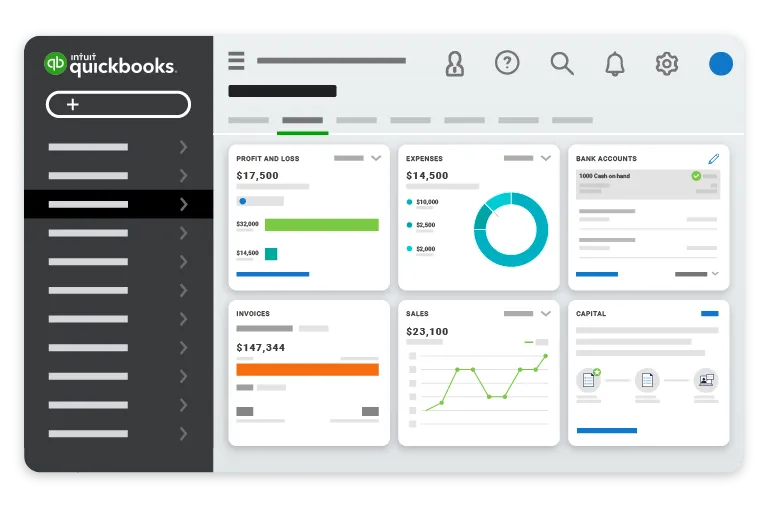
We highly recommend that you set up business bank accounts separate from your personal accounts. All transactions—incoming and outgoing—related to your business should be done via a business account.
Proper accounting practices are important for managing your finances and prioritizing the business’s long-term success. This will simplify tracking expenses, managing cash flow, and preparing taxes. Additionally, set up accounting software to automate your financial management tasks. Consider hiring an accountant to help with bookkeeping, financial management, and tax preparation. An accountant can provide valuable insights, provide compliance with tax regulations, and help you make informed financial decisions.
7. Purchase Electrical Equipment

With your business plan squared away, the training, certifications, and licensing in place, and your finances secured, it’s time to purchase the necessary electrician tools and equipment to do the job. Here are some of the things you will likely want right off the bat.
- Basic Hand Tools: Screwdrivers, pliers, wire strippers, and a utility knife are essential for everyday tasks.
- Power Tools: Drills, saws, and impact drivers can save time and effort on larger projects.
- Testing Equipment: Multimeters, voltage testers, and circuit finders help keep electrical systems are safe and functioning correctly.
- Safety Gear: Insulated gloves, safety glasses, hard hats, and flame-resistant clothing protect you from electrical hazards.
- Vehicle: A reliable work van or truck for transporting you and your tools, equipment, and materials to job sites.
8. Set Rates for Your Electrical Work
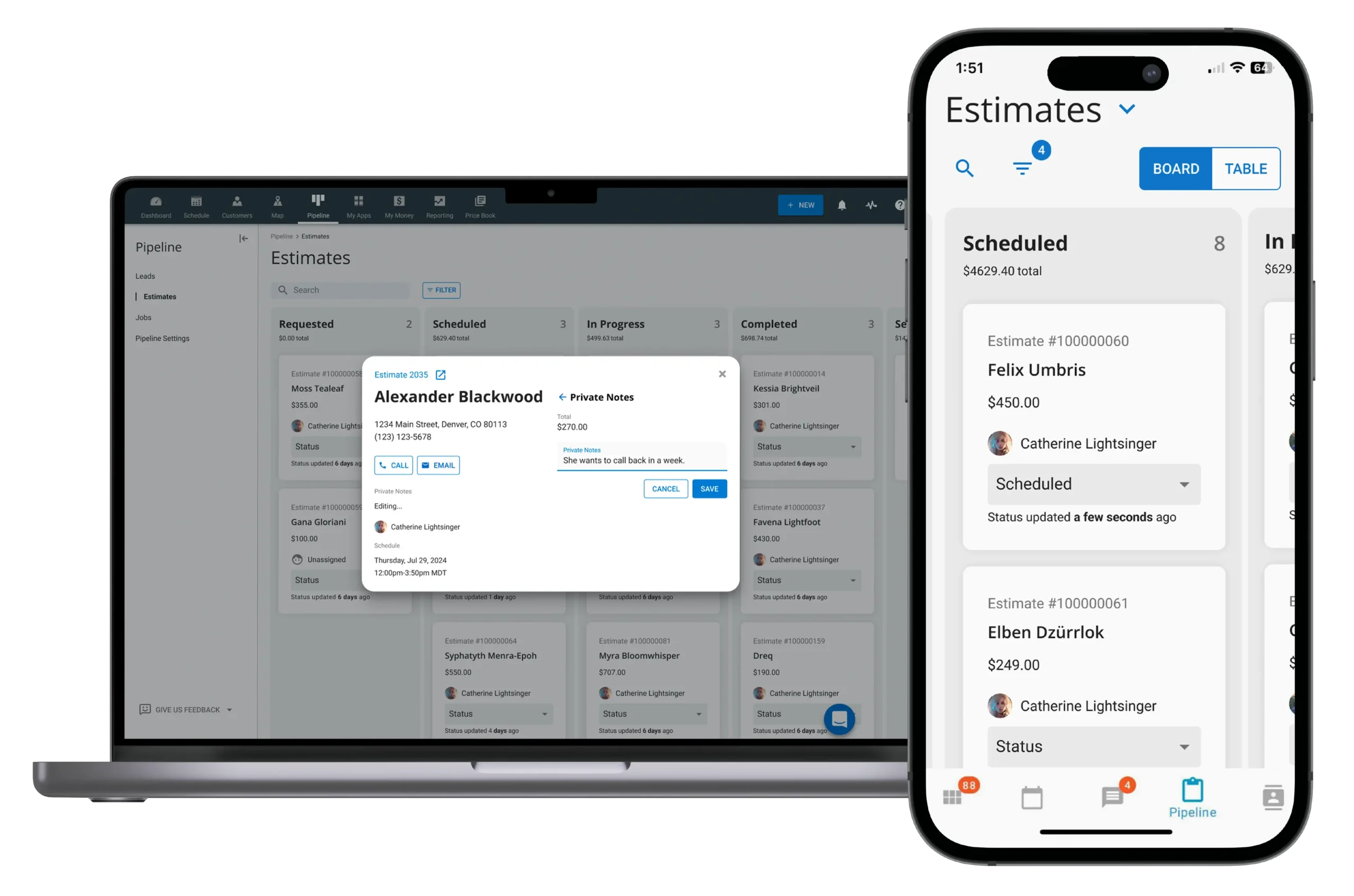
Deciding how much to charge for your electrical services is a key component in how to start an electrician business. After all, if you charge too much, customers will look elsewhere. Today’s consumers are super price-sensitive. In fact, they are 50% more price-sensitive than they were just two years ago.
Yet, if you charge too little, you might not make a profit. Or worse, you could develop cash flow issues that could quickly put you out of business. Here are some approaches to consider.
Time and Materials (Hourly Rate)
This pricing model involves charging customers based on the time spent performing the work and the cost of materials used in the job. The hourly rate covers labor costs, while materials are billed separately. This method allows for flexibility in billing, especially for projects where the scope of work may change or for long-term projects.
Pros:
- Flexibility: Allows for adjustments based on the actual time and materials needed.
- Transparency: Customers see a detailed breakdown of costs.
- Fair Compensation: Gets you paid for all the work you do.
Cons:
- Uncertainty for Customers: Clients may be wary of unpredictable costs. They want to know exactly what they are getting into.
- Complex Invoicing: Requires detailed tracking of time and materials.
- Potential for Disputes: Disagreements over time spent or materials used can arise.
Flat-Rate Pricing
Flat-rate pricing involves charging a fixed price for a specific service, regardless of the time and materials required. This method provides customers with a clear and predictable cost upfront, which can be appealing for straightforward or common electrical tasks.
Pros:
- Predictability: Customers know the cost upfront, which can increase satisfaction.
- Simplified Invoicing: Easier billing process with no need to track time and materials.
- Efficiency Incentive: Encourages you to complete jobs quickly and efficiently.
Cons:
- Risk of Underestimation: You may lose money if a job takes longer or requires more materials than expected.
- Limited Flexibility: Less adaptable to changes in project scope.
- Potential for Overpricing: Customers may feel they are overpaying for simple tasks.
Cost-Plus Pricing
Cost-plus pricing involves calculating the total cost of providing a service (including labor, materials, and overhead) and then adding a percentage for profit. This method covers expenses while securing a reasonable profit margin.
Pros:
- Comprehensive Coverage: All costs are accounted for, reducing financial risk.
- Guaranteed Profit: Profit margin is built into the price.
- Transparency: Customers can see how the final price is derived.
Cons:
- Complex Calculation: Requires detailed tracking of all costs.
- Potential for High Prices: This can result in higher prices compared to competitors using different models.
- Customer Perception: This may be viewed as less competitive or transparent than flat-rate pricing.
9. Market Your Brand to Land Your First Customers
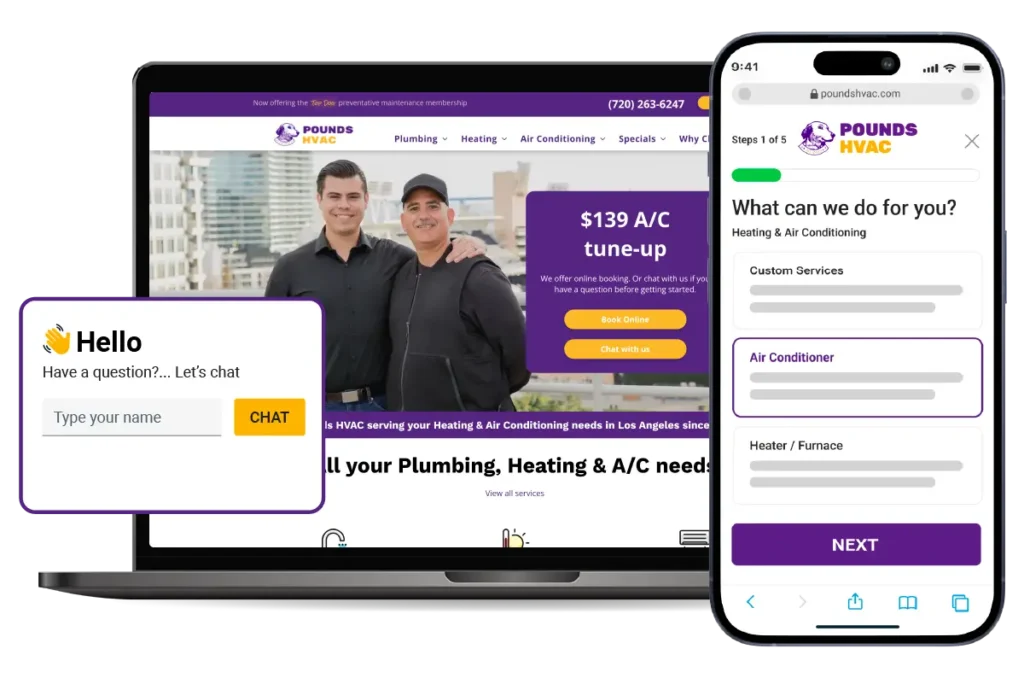
It’s going to take a bit of leg work to help your customers know you are out there and ready to help with their electrical needs. Word of mouth can only go so far. We suggest that you plan to spend some money upfront on getting your marketing strategy up and running. Once you have the following completed, you can estimate that you will spend a minimum of 2% to 5% of your revenue on marketing expenses.
Getting Started with Marketing Your Electrical Business
Here’s how to get started so you can generate electrical leads.
- Create a Professional Website: Your electrical company website should be user-friendly and mobile-optimized and include services offered, contact details, and customer testimonials. Regularly add high-quality content, such as blog articles, to boost your SEO (search engine optimization).
- Set Up a Google Business Profile: Claim and optimize your Google Business Profile to improve your visibility in local search results. This helps customers find your business, see your hours of operation, read reviews, and get directions to your location.
- Leverage Social Media: Use platforms like Facebook, Instagram, and LinkedIn to promote your services, share industry insights, and engage with your audience. Social media can help you build a community and reach a broader audience. Pay attention to reviews and be sure to implement a reputation management strategy by responding to all reviews, positive or constructive.
- List Your Business on Online Directories: Make sure your business is listed on popular online directories such as Yelp, Angie’s List, Thumbtack, and HomeAdvisor. These platforms can drive traffic to your website and generate leads.
- Use Local Advertising Methods: Consider local advertising options such as community newspapers, local radio, and sponsoring local events. These methods can help you reach potential customers in your area.
- Join Local Trade Associations: Join organizations like the National Electrical Contractors Association (NECA) to access resources, networking opportunities, and industry events. Building relationships within the industry can lead to valuable partnerships and referrals.
- Attend Industry Events: Participate in trade shows, workshops, and conferences related to the electrical industry. These events provide opportunities to showcase your expertise, learn about industry trends, and connect with potential clients.
- Network with Contractors and Suppliers: Building relationships with contractors, suppliers, and other industry professionals can lead to referrals and collaborative projects. Networking can significantly expand your reach and reputation.
10. Impress Clients with High-Quality Services

Being in the electrical business is about more than keeping the lights on, despite our little joke earlier in this article. Great customer service is about more than just a job well done, though trust us, that matters too.
Delivering high-quality service is about punctuality, paying attention to detail, and maintaining professional conduct at all times. This will help establish trust and reliability.
To build a strong reputation, actively seek out and collect positive reviews and testimonials from satisfied customers. Share these on your website, social media, and Google Business Profile to demonstrate your commitment to excellence. Additionally, consider implementing a follow-up process to confirm customers are satisfied with your work and promptly address any issues.
11. Hire Top Talent Electricians

While you may choose to be a one-person show, you’ll likely want to expand your business sooner than later. And that’s going to mean hiring some great talent. Come up with a great job description that clearly lays out the job’s responsibilities. Do market research on the average electrician salary in your area, and get that job description circulated on key sites such as Indeed and Monster.
When it’s time for an interview, be sure to look for these integral traits that can help your future team stand out from the crowd.
- Technical Expertise: Check that candidates have the necessary certifications, training, and hands-on experience to handle electrical tasks proficiently.
- Problem-Solving Skills: Look for individuals who can quickly diagnose issues and devise effective solutions. You want a team that can think on their feet.
- Strong Communication: Effective communication is a must for explaining technical details to customers, collaborating with team members, and sharing clear job expectations.
- Reliability and Punctuality: A dependable electrician who shows up on time and completes scheduled tasks builds trust with clients and colleagues.
- Commitment to Safety: Prioritize candidates who demonstrate a strong understanding of safety protocols and consistently adhere to industry safety standards to prevent accidents and prioritize a safe working environment.
After you hire qualified electricians, you’ll need to think about payroll, benefits, and employee time tracking. Housecall Pro streamlines the heavy lifting for you, so you can focus on growing your new electrical business.
Learn more: Payroll from Housecall Pro has everything you need to keep your new team of electricians happy with bonuses, PTO, health insurance, and work comp.
Scale Your New Electrical Company with Business Software
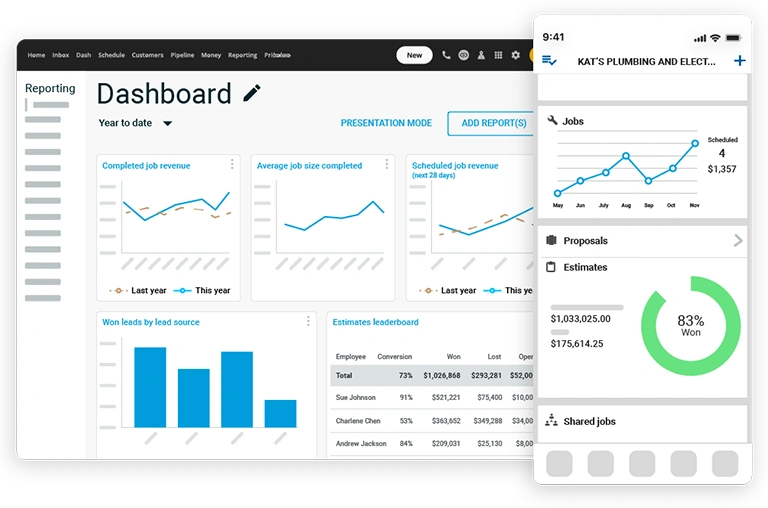
With these 11 steps in hand, you are well on your way to starting a profitable electrician company. But don’t think you have to go at this completely on your own. Housecall Pro offers electrician company software designed to help you with things like job profitability and reporting dashboards, scheduling, project estimation, invoicing, and so much more.
Don’t let manual processes bog you down and prevent you from scaling your business. Housecall Pro is here to help. Start your free trial today.
Frequently Asked Questions
-
How do electricians find clients?
-
Electricians find clients by optimizing their Google Business Profile for local searches, creating a professional website with strong SEO to rank higher in search results, running paid ads, maintaining an active presence on social media platforms, encouraging word-of-mouth referrals, and networking within industry events and local communities to build valuable connections and attract potential customers.
-
Is an electrical business profitable?
-
Yes, an electrical business can be profitable. Profitability depends on factors like efficient cost management, competitive pricing, high demand for electrical services, skilled labor, quality service, and effective marketing strategies. Building a strong reputation through excellent customer service and leveraging repeat business and referrals also contribute significantly to sustained profitability in the electrical industry.
-
What are some electrician business ideas?
-
Electrician business ideas include residential electrical services (installations, repairs, and upgrades), commercial electrical contracting, specializing in smart home installations, solar panel installations, electric vehicle charging station setups, emergency electrical services, electrical inspections, energy efficiency consulting, and providing maintenance contracts for businesses.
Diversifying services can attract a broader client base and increase revenue streams for the business. However, the key is to determine the services that interest you, make sure you can do them well, and knock them out of the park.


